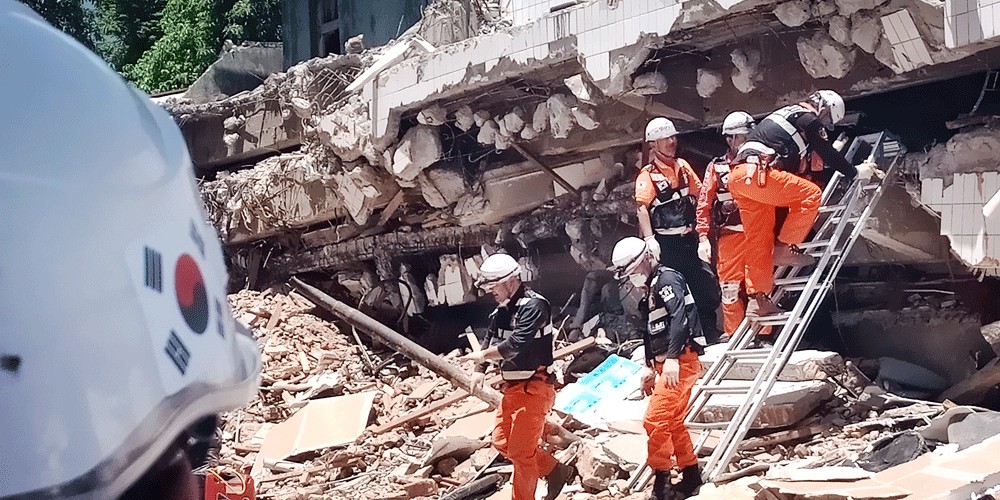Popular Reads
Top Results
Can't find what you're looking for?
View all search resultsPopular Reads
Top Results
Can't find what you're looking for?
View all search resultsDisaster management cooperation for ASEAN-Korea
The ASEAN region is prone to disasters and experiences large-scale disasters every four to five years. Thus, robust disaster management has become a pressing area and is being actively discussed among all ASEAN member states. ASEAN’s endeavors and plans to build a resilient region are reflected in the legally binding ASEAN Agreement on Disaster Management and Emergency Response.
Change text size
Gift Premium Articles
to Anyone
 Twenty days after a series of earthquakes, a tsunami and liquefaction hitting Palu, Donggala and Sigi in Central Sulawesi, personnel of South Korea’s Search and Rescue Team (SRT) work to retrieve bodies of disaster victims believed to be buried under the debris of the collapsed Dunia Baru Restaurant on Jl. Emmy Saelan, South Palu. Led by Kang Wong-lee from Korea Ocean Engineering & Consultants, the SRT team is continuing the operation despite the dangerous conditions at the site and the stench that has begun to emanate from the ruins. (The Jakarta Post/Ruslan Sangadji)
Twenty days after a series of earthquakes, a tsunami and liquefaction hitting Palu, Donggala and Sigi in Central Sulawesi, personnel of South Korea’s Search and Rescue Team (SRT) work to retrieve bodies of disaster victims believed to be buried under the debris of the collapsed Dunia Baru Restaurant on Jl. Emmy Saelan, South Palu. Led by Kang Wong-lee from Korea Ocean Engineering & Consultants, the SRT team is continuing the operation despite the dangerous conditions at the site and the stench that has begun to emanate from the ruins. (The Jakarta Post/Ruslan Sangadji)
I
had a chance to attend the meeting on international disaster relief cooperation in Aceh in 2008. A tsunami swept the province at the northwestern tip of the Indonesian archipelago in December 2004, claiming about 170,000 lives.
At the meeting, then-Aceh governor Irwandi Yusuf expressed his appreciation to the international community for lending their hands to the province’s recovery. A former leader of the Free Aceh Movement (GAM) separatist group, Irwandi said it was the tsunami that put an end to the long-standing conflict between the rebels and the Indonesian government. I still remember the sadness in the governor’s eyes as he recalled how the disaster caused indescribable tragedy while paradoxically, it also brought peace back to Aceh.
More than 10 years later in January 2019, I had another chance to visit Indonesia, but this time to live here. I was seconded to the Mission of the Republic of Korea to ASEAN from the South Korean Interior and Safety Ministry. Over the years, most Southeast Asian countries, such as Indonesia and Vietnam, have achieved exponential economic growth which exceeds 5 percent annually. Indeed, ASEAN, as an engine, has driven global economic growth. For this reason, many countries have endeavored to forge closer ties with the region.
Against this backdrop, the Korean government unveiled its New Southern Policy in 2017 to realize a “people-centered community of peace and prosperity together with ASEAN”. As a result, the Mission of the Republic of Korea to ASEAN was tripled in size, making it a cornerstone of the New Southern Policy. The three pillars of the New Southern Policy — the “3Ps” of people, prosperity and peace — pursue broad and inclusive relations between Korea and ASEAN, encompassing not only economic cooperation but also social and cultural exchanges.
In order to materialize the 3Ps under the New Southern Policy, a number of collaborative projects have been initiated. One of these is cooperation in disaster management that is cross-sectoral and cross-pillar.
The ASEAN region is prone to disasters and experiences large-scale disasters every four to five years, including the Indian Ocean tsunami in 2004, Cyclone Nargis in 2008, Typhoon Haiyan in 2013 and the Sulawesi earthquake and tsunami in 2018. Thus, robust disaster management has become a pressing area and is being actively discussed among all ASEAN member states. ASEAN’s endeavors and plans to build a resilient region are reflected in the legally binding ASEAN Agreement on Disaster Management and Emergency Response.
Recently, ASEAN has welcomed Korean cooperation in strengthening ASEAN’s disaster management system. I believe Korea is a trusted partner in the region whom ASEAN could work with.
Korea has been a proactive supporter who has provided large-scale aid to affected areas, including the detachment of the Korea Disaster Relief Team and the provision of relief supplies, and has made efforts to disseminate technologies, such as flood forecasting-warning systems, to prevent and analyze disasters in Southeast Asia.
Recently, Korea, the ASEAN Secretariat and the ASEAN Coordinating Center for Humanitarian Assistance on Disaster Management (AHA Center) decided to implement joint projects such as training disaster specialists in the region and developing information technology-based training programs. These collaborative projects are not one-offs, but a multiyear project which aims to institutionalize effective disaster management in the region. As such, the projects will be geared toward implementing the 3Ps of the New Southern Policy.
What ended the endless struggle in Aceh was neither political ideology nor economic interests, but the empathy that the Indonesian government and GAM shared. Both sides agreed that helping the disaster victims start new lives was the most urgent agenda.
The lessons learned — the efforts to strengthen cooperation in disaster management between ASEAN and Korea for the altruistic purpose of protecting precious lives — is the genuine foundation for establishing a “People-centered ASEAN-Korea Community” as envisioned in the New Southern Policy.
***
Secretary, Mission of the Republic of Korea to ASEAN










